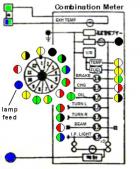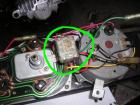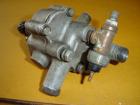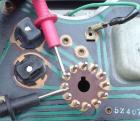Contents |
Overview
Also see:
- Wiring Diagram
- Wiring Harness Instrument Panel Harness
- Manual vs Automatic harnesses differ
- early harnesses differ more than those after April 1971
Meter Connector
The Instrument Panel Harness uses this connector for the instrument panel (meter cluster):

Be aware that while all 1200s use this connector, the wiring actually differs from round-gauge harnesses, rectangle gauge, and late model connectors.
Round Gauge Cluster vs Rectangle Cluster
PROBLEM: indicator globes stay on, no IGN lights. Move right indicator, left indicator flashes. Signal to left and oil light flashes.
PROBLEM: Turn on the lights and smoke comes out.
If it smokes, it is not earthed properly. The cluster bolts to the dash metal frame. If you wish to temporarily work with it, jump a wire to the dash frame.
If you upgrade the rectangle cluster to round cluster, beware the wiring is different.
- Some pins in the circular dash connector are different. Pop the pins of the connector and re-insert in the appropriate order.
- Round Tachometer may be wired in series (differently from aftermarket tachometers) to the IGN circuit that's already under the dash (this is how the factory wired tachometers). Or in series with NEG side of coil if you wish to run wires from coil into cabin. Because the tachometer works by induction, it doesn't matter which side of the coil it is wired into.
Dash Changes for Sedan, Ute and Station Wagon
I think it take a skinny little screwdriver, like you use for watches/sunglasses. The ones that come in the cheap set of 5 in a plastic case at most '$2 shops'. Loosen the prongs pushing a screwdriver in the wire side of the connector, while pushing with a small allen key in the other side. I'm sure there are professional tools to do the same job, but you can do it for cheap if you apply a little patience.
dattodude's original information sheet:

Speedometer
The speedometer has a light for use at night. See the lamp section.
1972 Facelift speedometer has special switch:
Speed Switch
Ute Amplifier Speed Switch
Amplifier for B120 ute Throttle Opener Assembly (see Emission Controls). It's only fitted to the Manual Transmission models.
The speed detecting switch is part of the speedometer assembly and is installed in the speedometer. The amplifier prevents damage to the speed detecting switch which actuate the throttle opener only when the car speed is above 10km/h.Pub No. SM6E-EMC0A0, Page EC-11
Switch has three wires. It looks as if, from these photos:
- Red: Ground ? fits on round-side connector
- Black: -- goes to Red wire coming out of top center of panel
- Green: Unknown
Double-check before using.
USA Amplifier Speed Switch
USA model from 0772 use an amplifier speed switch.
- 25035-H7000 ASSY-AMPLIFIER SPEED SWITCH
Cluster Gauges
The cluster gauge contains:
- Fuel Gauge (Petrol/Gas gauge)
- Water temperature gauge
- Oil pressure indicator lamp (see "Troubleshooting Oil Light" below)
- Indicators lamp (see "Troubleshooting Dash Lights" below)
- High beam indicator lamp
- Turn Signal indicator lamps
- Brake failure lamp
The coolant/water temperature gauge incorporates a voltage regulator.
- If both the water and fuel gauges are off, suspect the regulator
- If only one gauge is incorrect, suspect a bad connection, usually at the sensor
Fuel Gauge
Back at the Fuel tank, there is a single Yellow (Y) wire on the sender.
- connects to Y wire in the main body harness
- connects to Y wire in the dash wiring harness
- connects to Y wire in the cluster connector
The sender is grounded through the tank body.
Troubleshooting Fuel Gauge
A non-working Fuel gauge is usually one of three things:
- Bad 'sender' (sensor) which is in the fuel tank
- Bad gauge in the dash
- Bad wiring
- Pull the Fuel sensor wire (Yellow) off at fuel tank
- Ground/earth this wire
- turn IGN switch on and observe gauge:
- Gauge still dead. It is not caused by fuel sender. Check for loose wiring, at back of dash, or at dash wiring harness connectors
- Gauge goes to Full. Bad sender
Sender Resistance Check
You can also check the Resistance of the sender. Remove Yellow wire and measure between terminal and bare metal of sender: It should read higher than 10 ohms, but less than 88 ohms. If it is higher or lower than this range, replace the Sender.
Sender Full-Range Test
- Remove Fuel sender from tank. This is fairly easy with Sedan, or with ute after removing inspection cover from tray. Not easy with Coupe.
- With wiring connected to sender, ground/earth the top of the sender to body ground (using a jumper wire)
- Float down, gauge should read below E
- Float up, gauge should read above F
The Fuel Tank Sender (fuel sensor) has a float, and as it rises and falls with the fuel level, it varies the electrical resistance (Ohms) of the sensor. As measured by club members, by moving the float up and down from stop to stop:
- 12 ohms fully up
- 88 ohms fully down
- 35 ohms half full (per Nissan Factory Service Manual)
Dash Lights
These dash lights should light up when you turn the key to ON, before you start the car:
- Oil pressure lamp
- CHG lamp
Both should go out as soon as the engine is started.
These do NOT light up on the pre-start check:
- Brake lamp
- Beam/M.B. lamp
Troubleshooting Oil Light
The sensor for the Oil pressure lamp is on the fuel pump just above the oil filter (left side of A-series engine):
This pump has a T-connector added. The original oil pressure sensor is the spade connector pointing down. A fitting for a mechanical oil pressure gauge is on the other end of the T.
The sensor is an "idiot light". It simply connects the wire to ground when there is oil pressure. So before you start the engine (IGN key on), the Oil lamp bulb is connected to earth/ground through this switch and lights up. As soon as the engine starts and pressure builds, it disconnects the ground circuit so that lamp goes off.
If the lamp never lights up (IGN key on, engine not started):
- Be sure the wire at the oil pump is connected to the connector
- Pull it off and then on again to ensue it is tightly connected. If it is not, you can slightly crimp it with pliers to make it fit better
Check the lamp again. If it still doesn't come on:
- Reach behind the dash and twist the bulb out. If it is burnt out, replace it
If the light comes on (IGN key on, engine not started), but does not go *off* when the engine starts:
- Be sure the wire at the oil pump is connected to the spade connector. If it is off and lying against the engine or body is has a natural earth/ground and so won't work correctly
If that is not the problem:
- Disconnect the wire at the pump. Place it where it doesn't touch metal. Test the light again (with IGN key on):
- Light is off: replace the sensor. One from most any Datsun model will fit.
- Light stays on: You've got an unusual problem with the wiring or dash gauge cluster
This test is for functionality of the light. You don't need to start the engine to test this. If the light checks out OK, but there is no pressure or you suspect so, see Lubrication System Diagnoses.
Troubleshooting Dash Lights
After more than 30 years, these sometimes don't work. Could be a burnt-out bulb, corroded contact, or broken wire (turn signal indicators use wires).

![[Datsun 1200 encyclopedia]](/wiki/upload/wiki.png)










